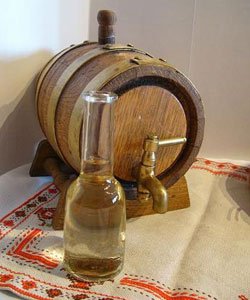

© Photo: Lyudmila Savova
In times of crisis a number of Bulgarians are concerned with prices and wonder which type of rakia is cheaper. The homemade, of course. Production of rakia at home is a part of the Bulgarian culture in a number of regions. The tradition is attractive to foreigners, too. Two years ago the retired English policeman Michael Weavers, who now lives in the Bulgarian village of General Toshevo won the local rakia competition. The locals now call him with respect Bai Michael.
It is known that monks from the monasteries near the town of Troyan in Central Bulgaria are masters of the plum rakia, which is prepared according to a recipe from the 19th century. At least 12 different types of herbs are used but special varieties include 33 herbs. In the monasteries the rakia is stored in oak casks. Before pouring the rakia into bottles, it is blessed in front of an icon of St. George.  Vassil Mandzhukov from the village of Oreshak told us more about the tradition of rakia production. “You should only drink rakia that has aged for 12 years,” he claims. “When we make rakia, we keep it in an oak cask for 6 months, before pouring into glass bottles and burying them in the ground,” he explains and adds: “Aged rakia has different qualities and that is why my father diet at 95.”
Vassil Mandzhukov from the village of Oreshak told us more about the tradition of rakia production. “You should only drink rakia that has aged for 12 years,” he claims. “When we make rakia, we keep it in an oak cask for 6 months, before pouring into glass bottles and burying them in the ground,” he explains and adds: “Aged rakia has different qualities and that is why my father diet at 95.”
English: Alexander Markov
On March 30, 2004, the first issue of a Bulgarian newspaper in Great Britain, "BG Ben", was published. The beginning was modest – eight pages in A4 format and a big dream – to become a unifier of Bulgarians on the Island. Today, 20 years later, the..
The Bulgarian State Railways (BDZ) is organizing a holiday trip for railway enthusiasts. A Christmas train with a steam locomotive and six festively decorated carriages will run on December 21 on the Gorna Oryahovitsa - Pleven - Gorna..
The Bulgarian Hotel and Restaurant Association has presented its annual awards for professional achievements in the field of tourism, in which it also distinguished the work of Swiss Elizabeth Bleecker in promoting Bulgaria as a tourist destination in..
The village of Zmeyovo near the town of Stara Zagora is celebrating today, December 21, its traditional Festival of Pelin Wine. According to an..
Each piece evokes warmth and nostalgia because each is handmade and unique. The silvery reflections on the glass baubles take us back to childhood, when..
The making of knitted products is a traditional craft that deserves a revival and a new life, believes Alexandrina Pandurska, known for her numerous..

+359 2 9336 661
